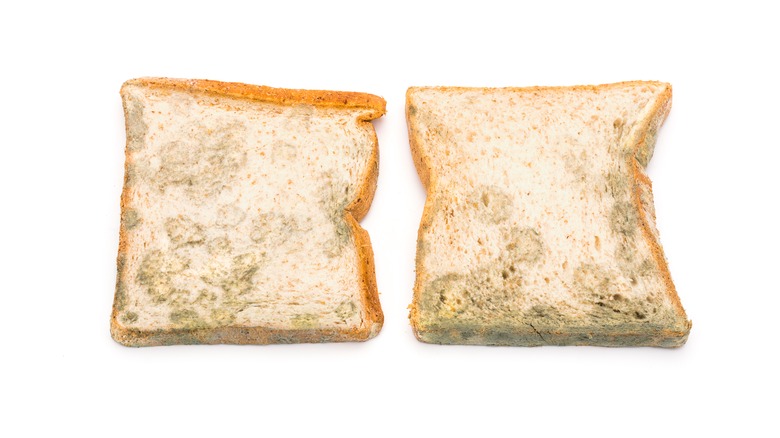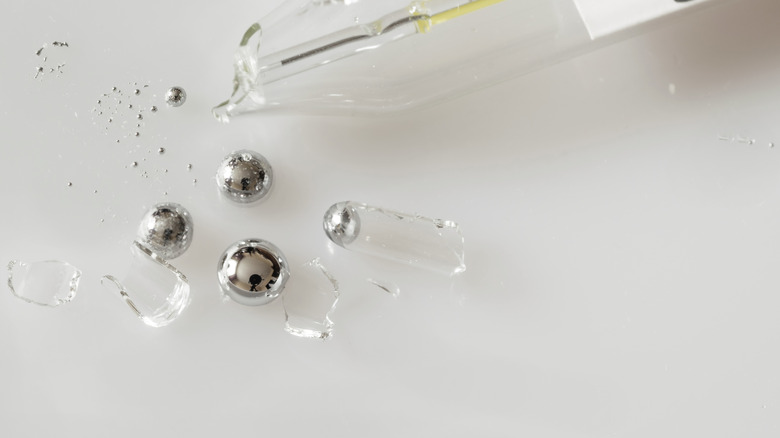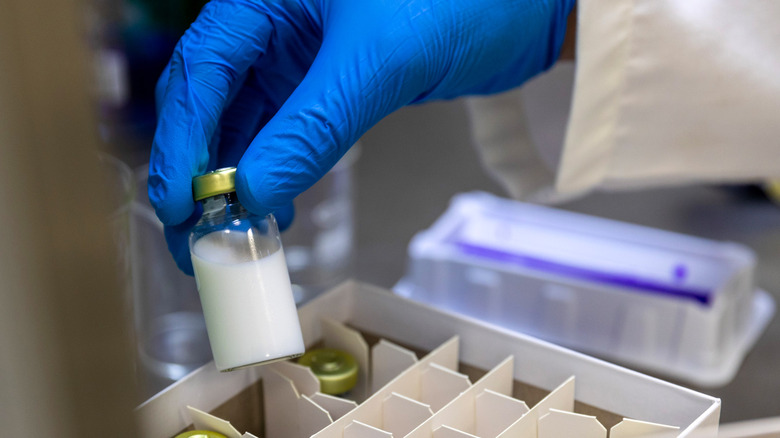The Truth About A Man In Germany Who Poisoned His Co-Workers
Over 20 years, quite a lot of people got sick or died under mysterious circumstances at the same German company (via The Washington Post). The terrifying discovery of the man behind it all led to a prison sentence — but not before 21 people died in what appeared to be a bizarre crime spree.
Klaus O. was a quiet man who worked at a company in the town of Schloss Holte-Stukenbrock in Germany (via The Guardian). He spent decades working at ARI Armaturen, which manufactures metal parts (via Deutsche Welle). According to his co-workers, Klaus was not a talkative guy (via The Washington Post). He reportedly arrived at work and would then go the entire day without saying "hi" or talking to anyone about anything. It seemed like the 57-year-old just preferred to keep to himself. The New York Post reports that Klaus was a dedicated worker who had been at the company for 38 years.
'He always kept to himself'
One manager called Klaus "conspicuously inconspicuous" (via Deutsche Welle). Another of Klaus's victims, a man he had worked with for three decades, said (via The Washington Post), "He always kept to himself, did not speak and had no friends. I had no problem with Klaus, and I accepted that he does not want any contact. There was never an argument."
But Klaus' co-workers were having lots of weird illnesses and symptoms. One startling case involved Nick N., a 23-year-old employee who was a summer apprentice with the metal company. He began to have lasting bouts of fatigue and noticed that his hands were starting to go numb with no explanation. Then one day, he started vomiting and was struggling to walk. He went to a hospital, where he fell into a coma and did not reawaken. After three years, Nick N. died at age 26. And he was far from Klaus' only victim.
Klaus might have gotten away with these heinous and extreme poisonings if it weren't for security footage (per The Cut).
Poisoned sandwiches
At lunch one day, one of Klaus' co-workers, Simon Radtke, noticed that his ham and cheese sandwich had a suspicious brown and white powder on it (via The Washington Post). He started to snap photos of the food without eating it (via The New York Times). Radke noticed that this had happened a few times, and he filed a police complaint.
Following Radtke's lead, ARI Armaturen installed cameras in the break room. Sure enough, Klaus O. was caught red-handed. On camera, he went into his colleague's personal backpack, took out his lunch, and sprinkled powdery substances onto his co-worker's food. The Washington Post reports that he carried the chemicals around in tiny vials.
Investigators later realized what the substance was: lead acetate, which is nearly tasteless, toxic, and absolutely deadly if eaten in large amounts (per Deutsche Welle). Also known as "sugar lead" because of its sweet taste, lead acetate is usually used in paints, dyes, and textiles (via ScienceDirect). The victim's last sandwich, which he saved as evidence, contained 71,000 micrograms of lead (via The New York Times).
Just a prank?
One manager who knew Klaus said (via Deutsche Welle), "In the beginning we thought it was a misconceived prank between co-workers, and not a murder attempt." But it quickly became clear how serious the situation really was. When Klaus was caught, he had a bottle of lead acetate pills in his pocket (per The New York Times). Police officers subsequently raided his home — and what they found was horrific.
The New York Post reports that when investigators searched Klaus' property, they found large quantities of a number of poisonous chemicals, like lead, cadmium, and mercury. Klaus had created a DIY chemical laboratory in his basement. Shockingly, The Guardian reports that the judge on Klaus' case called the contents of his lab "more dangerous than all combat agents used in the second world war." Investigators found that when Klaus' property was tested, it showed unusually high levels of mercury.
Prolonged exposure
In May 2018, Klaus O. was finally arrested (per The New York Times). During the trial, one psychiatrist who spoke with Klaus tried to explain his actions. Apparently, Klaus liked to poison people and then see what physical ailments would happen to them. He apparently liked to experiment and mix the chemicals together to create new reactions. He had even recently ordered a new shipment of chemicals online.
During his trial, Klaus' siblings testified that he had a difficult upbringing. Choosing to remain silent aside from telling the judge his name, Klaus did not speak at all during the trial proceedings. Klaus' actions had lasting impacts on some of his victims (per The Guardian). Although many died, some suffered for years afterward. Per The New York Times, one worker who often had the same shift as Klaus O. kept going to his doctor over and over with the same symptoms. The cause turned out to be kidney damage from repeated exposure to toxic chemicals.
As serious as homicide
Two of Klaus O.'s other victims, ages 27 and 67, also survived (per The Guardian). But these two men were poisoned with cadmium and lead, and they now have permanent and chronic kidney damage. They will also both have a higher risk of getting cancer in their lifetime due to this poisoning. One of Klaus' victims died years after he was originally poisoned (per The New York Post). The victim's parents later testified that he had suffered, remaining in a coma for four years before dying.
The New York Times reports that Klaus O. faced 10 charges, including aggravated attempted murder toward three people he worked with. The judge said Klaus's actions should be taken just as seriously as a homicide (via The Guardian). In Germany, criminal suspects do not have their last names released publicly, and Klaus appears to cover his face with a folder in most courtroom photographs.
In prison, but still dangerous
ARI Armaturen is still trying to determine how many other victims were affected by Klaus O. and his actions (via The New York Times). There were at least 21 deaths in or around the workplace since Klaus began working there, but it is unclear how many people he killed in total. Police gathered a team of homicide investigators, who considered exhuming the remains of former employees who died to test the levels of metal found in their bodies. They also started to interview members of these employees' families to determine if poisoning could have been the cause of death (via Deutsche Welle).
In 2019, Klaus was sentenced to life imprisonment, which is reportedly an extremely rare sentence in Germany (via The Cut). Per The Guardian, even a life sentence in Germany is only about 15 years, but due to the severity of the case, the judge requested that Klaus remain incarcerated indefinitely. He believes that Klaus is still a danger to those around him.
The victim who had the ham and cheese sandwich and reported Klaus actually ended up testifying against him. The victim said he didn't think to guard his lunch or personal items against being tainted. He replied (via The Cut), "Nobody believes that a colleague does something like that. Everyone trusts in each other."






